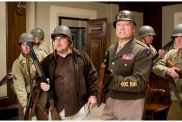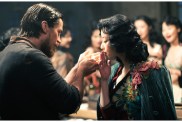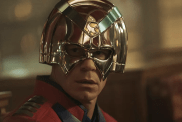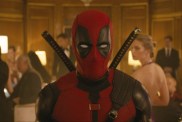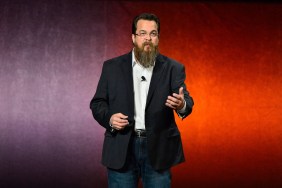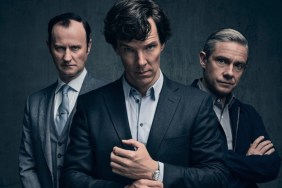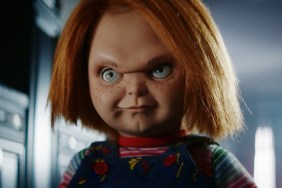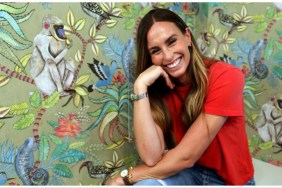After years of experiencing poverty and abuse, a homeless Tyler Perry, who once had to live in his car for three months, had an inspiring moment when he began writing down how much resentment he had towards his situation. He learned how therapeutic writing could be after watching an episode of “The Oprah Winfrey Show” in which it was suggested that keeping a journal could be cathartic.
Years later he is now a successful filmmaker with a huge following and a string of accomplishments behind his name. His fourth film, Why Did I Get Married? centers around a group of four married couples on vacation together struggling with betrayal, commitment and secrets. The movie is based on his play with the same title and has an ensemble cast which includes Janet Jackson and Jill Scott.
ComingSoon.net talked to Perry about his new project:
ComingSoon.net: What was it you saw in these actors that made you want to cast them?
Tyler Perry: First of all, I love new faces. I love breaking new faces in. Lamman [Rucker], Denise and Sharon had already done a couple a few things and “Dreamgirls.” As I was writing the movie, the cast just kind of came together. What I do is just write it and surrender it. Denise [Boutte] really pushed for Tasha [Smith] to have this role. We had just did “Daddy’s Little Girls” and I’m so glad she got it because I don’t see anybody else playing the role. She was amazing. Janet [Jackson] and I were talking I think a week or so before we started because their deal went really quick. Jill had auditioned and was perfect for it. Lamman had auditioned. So it just all worked out.
CS: You’ve said this is the best movie you’ve made. Why?
Perry: I try to grow on every film, but I’m walking now. I was crawling on everything else. The way this story was told I think was very unique. Using the camera the way I did was very different for me. There’s some people who really get into camera movement and all this other stuff, but for me, I really stretched it and having an amazing cast really made the movie come alive because everybody brought their own personality to it.
CS: Was their concern on either of your parts that when you bring in a big name like Janet Jackson that this wouldn’t be as much of an ensemble cast?
Perry: Janet was very, very adamant going in that she wanted an ensemble piece. I thought, “why don’t we change this?” She’s like, “no it’s all there. Everything is there. It’s perfect for me.” She’s very fair that way. I think the biggest hurdle was getting over Janet Jackson as you’re watching the movie, but if you watch it for longer than 15 minutes, you realize that Janet is not Janet. She’s Patricia the character. She’s totally surrendered to it.
CS: Could you talk about your directing style and how much free reign you give the actors?
Perry: 90% of it, maybe 95% of it is my writing. I think there’s certain moments though that you just have to let happen like when Jill was doing that scene and the cameras are on her. I was asking her questions and if you’re a person who is in tune with people you can pay attention and you’ll see that their body language is telling you they want to say more. They want to go outside the character. Even with Tasha, even with Janet, they want to go outside of the character and there’s more they want to say. I think if you’re a director who is very controlling, you wouldn’t want that to happen. For this kind of piece and all of us playing friends, I like to hear what everyone else has to say. You still have the power to edit it if you don’t like it. I loved everything they did though.

CS: From your point of view, and you touched on this, as a filmmaker, what were the challenges for this particular movie.
Perry: I can honestly tell you there wasn’t one, not one on this film. I was like if you want to talk about “Diary” or some of the others there was not one challenge on this, this was so meant to be, this cast and the way it fell together I just surrendered to it and said “Okay God, whatever is going to be let it be” and it turned out to be this great movie. Whether 10 people see it or 100 million I feel really good about it. It is an amazing film and there weren’t any challenges that I can speak of.
CS: You said on “Oprah” the other day that this was the best movie you have ever made. Not to take away from your past movies, but why did you feel that way?
Perry: I will take away from the past movies I’ve made. I’m learning in every film. I think you give me five more and I will be able to hang with some of the big guys, you know. But in every film I learn a little bit, I grow a little bit and I try to become, just as I do in life, I just try to become a little better. “Diary” was a great movie. I didn’t direct it. The “Family Reunion” was a great movie, it was horrible directing. I think because I look at it, I can’t even look at it. It will be on Showtime and I will go “Oh, I put the camera there? Is that what I did?” But this movie I felt free enough and had enough fun to make it to be what it is.
CS: I really like the fact that your characters, especially your black characters have prominent yet admirable careers. Is this something that you do intentionally or is this an expectation you would hope will be in future films for black characters?
Perry: Well, I mean if you look at “Daddy’s Little Girls” he was a mechanic, a struggling mechanic, and the baby mama was a drug dealer so I think that there are so many different expressions of who we are as African American people and I want to cover it all. I don’t think that you can lock us into one little box and say this is who we are. These particular people happened to have all gone to college and have been educated so this story will represent that side of who we are as people, but I will be going in a lot of different directions, but what you won’t see is a lot of if any negativity from me. I won’t do that.
CS: Why do you think relationships go wrong?
Perry: I had just come out of a relationship that was really one of the most difficult ones I have been in, and I learned so much from it. I’m always asking questions, like “God, what was this about? Show me the lesson in this.” As I was asking and finding the lesson, I started writing these characters. So that’s where it came from for me. As far as why do relationships go so wrong, I think people are looking for other people to validate and to fix them rather than doing the work themselves to get themselves, to make themselves whole, to get themselves better so that they can be ready for the other person.
CS: Can you talk about taking this from stage to film?
Perry: I think it relieves it. Stage, there are a lot of challenges because you’re so limited to two hours and how far you can go and how many places you can take it. On film, my mind and my imagination could just go and open up. That’s why we ended up in Canada shooting for a week, rather than on some soundstage somewhere. But most of the movie was shot on a soundstage but it takes place over a year so it frees me. To write film frees me up.

CS: What do you want audiences to get out of this movie, and your own relationships with God?
Perry: What I’d love for people to walk away from with this movie is clearly this: I think a lot of people are going to see themselves. I think there are a lot of Sheilas, I think there are a lot of Angelas, I think there are a lot of Trinas, there are a lot of Terrys, there are a lot of Troys. They will see themselves and want to either get better or stronger and change or they won’t. I think that it’s just a lesson. What I’d love for the movie to be is a mirror for people to just look at themselves and see is this me, do I need to change and how can this help me in my relationships.
CS: And God?
Perry: It is a very important part in my life and you’ll see it in most of my work because I don’t know how to solve a problem without prayer. So a lot of times in my movies, that’s where the characters will go. They’ll pray, they’ll need some sort of inspiration and if somebody walks away feeling like they need God in their lives, then I’ve done my part. What I’d like to do is have it be an invitation rather than it be preachy or over the top or beating people over the head.
CS: are you looking to branch out into different genres?
Perry: Yeah, I’ve written all kinds of movies that I haven’t had a chance to do yet because “Madea” and the whole play has been my niche. That’s my area where I’m best known. But I’ve got a piece about a Jazz Singer and a Holocaust survivor in 1947 that I’ve been excited about since I wrote in 1995 and haven’t had a chance to do it just yet. But I’d like to move into that, and I’d love to move into sci-fi and action. So, there’s a whole lot more that I want to do. But right now, I’m loving telling these kind of human interest stories that are really, really speaking to people in positive ways.
Why Did I Get Married? opens October 12th.
